In a world where life can often rush past in a blur of deadlines and distractions, there is one man who has chosen a different path—one of deliberate and unhurried steps along the spiritual retreat of the Camino.
For over one year, he’s been averaging 25 kilometres everyday along the ancient pilgrimage route, finding solace in putting one foot in front of the other and the ever-changing landscapes, cuisines, and countries that stretch out before him.
In a journey marked not only by physical distance (over 5480km so far, to be precise) but also by profound inner transformation, he reminds us all of the power of cultural enrichment and tells us how he has successfully connected with people from all over the world.
In the following interview, he shares the wisdom gained from his extraordinary journey, and offers insights into the connections between the Camino, the self, and the world beyond.
Can you start by telling us a bit about yourself?
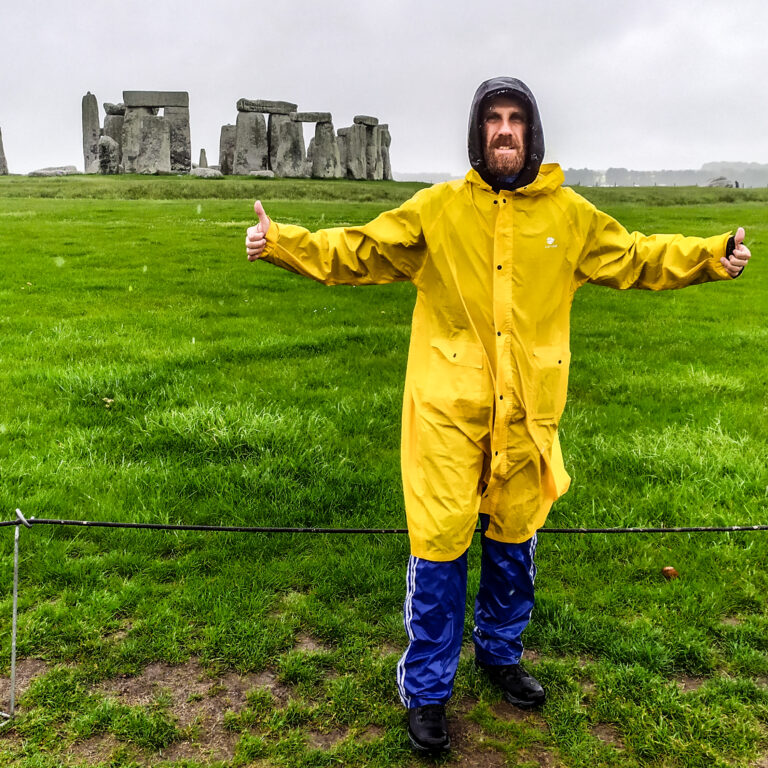
Cima towards the start of his walk at Stonehenge, England.
My name is Roberto Cimarosa, but everyone calls me Cima. I’m from Italy. I’ll be 45 in October. I’ve been a freelance editorial layout graphic designer for over sixteen years. I started the Camino in London on April 28, 2023, five days after running the London Marathon. I’ve been on the Camino for over a year. Where I think I end up, however, is a big dilemma. I’m tickled by the wacky idea of walking back to Italy. I don’t plan anything that long term yet because the last time I did, I said I would start the Camino del Norte in mid-June, and I ended up in Irun (the start of the Camino del Norte) at the end of August… you can see how “good” I am at planning.
What inspired you to embark on the Camino journey?
I couldn’t give you a deep, strong motivation. I wanted to go back to Santiago, alone this time, doing something “amazing” that would reconcile my good fortune of being able to work anywhere and the desire to live by traveling. After returning from seventy days in the States for my fortieth birthday in December 2019, I had already fantasized about something absurd, challenging, and ephemeral. Then there was the pandemic and so I was unable to do anything else but fantasize about my “Grand Plan”: to ride the Panamericana (from Prudhoe Bay, Alaska to Ushuaia, Tierra del Fuego, Argentina) by bike. So, during the pandemic I put down hypothetical stages to figure out what detours to take to discover as much as possible.
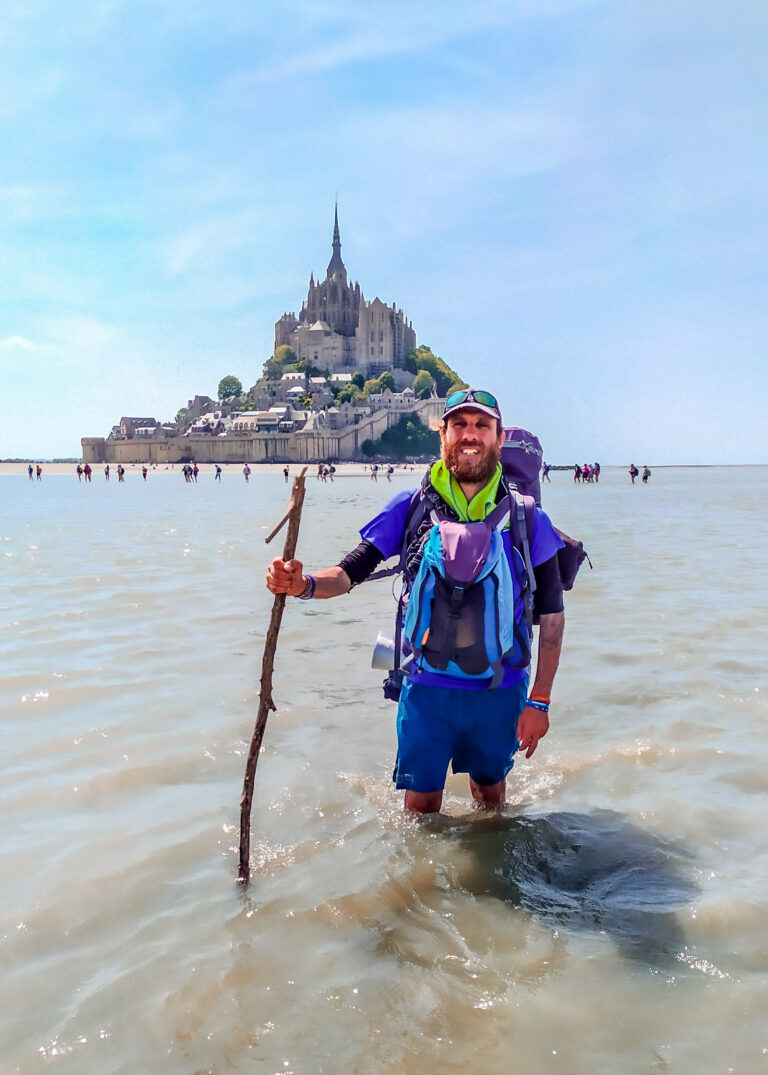
Cima at Monte Saint-Michel in Normandy, France.
Then a few years went by but walking and doing the Camino was always in my head, and the people, places, food, feelings, and emotions already encountered on the French Trail with my father in 2019 from time to time would come overbearingly back into my head. Instead, the unconscious motivation or drive was my father who did the Camino alone the year before I left (in 2022): Lisbon – Santiago – Porto. As they say, “the apple never falls far from the tree.” So, maybe a little envy and admiration made me undertake this Camino. I don’t think I have a strong spirituality but if anything, the unstoppable desire to know, to see, to observe, to admire, to feel… that’s it.
How has the Camino experience impacted your outlook on life so far?
I have to admit that until not so long ago I wasn’t really a nice guy. I was very ill-tempered; at times I was called arrogant. Let’s say a little “pirla” (“stupid” as they say in Milan). And so yes, the Camino has changed me in a positive way. As I told a Pilgrim not long ago, “I have found that it is much more effective to have a “kind” word than a “cynical, rational” one.” So, I consider this path of mine a positive process of mental, personal, important, and not indifferent, growth. Especially in interacting with people who may not speak your language, but you try and try again, and slowly you understand each other. You always learn something, the wise men say, and that can be a language, taking a situation differently to how you’ve always taken it, talking to people from any part of the world, different social class, issues, and ages from yours. That gives me so much satisfaction.
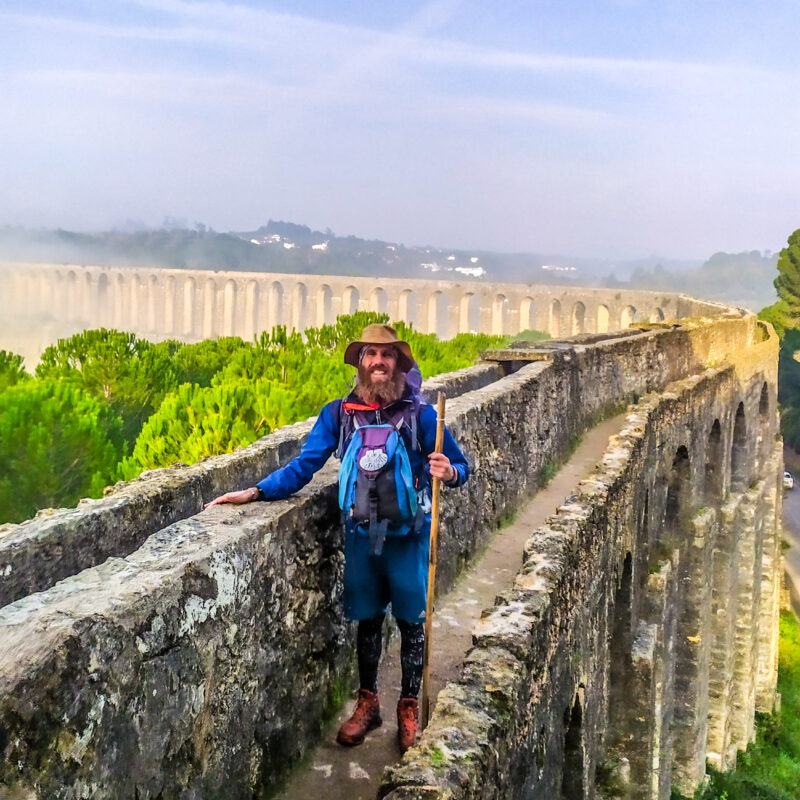
On the aqueduct at the Convent of Christ in Portugal.
Can you share your most memorable encounter or experience you’ve had along the way?
[Note that Cima wrote more than one page of special people and interactions that were edited down for space purposes].
I would not want to and cannot mention just one because that would be reductive. Fortunately for me there have been many, and luckily, I can say that I have always met wonderful people with whom I’ve shared a meal, a beer, hugs, tears, emotions, dips in the ocean, rain and shine.
I like to remember special encounters such as Greg and Dee (we called ourselves trés café con Leche), I shared so many days with them and so much “brotherly love”. Bruno on the GR34 in Brittany who even if we didn’t speak much to each other, the looks and the body language said a lot. Bianca, who is probably a relative of mine (she has the same last name and origins from the small town in Calabria as my maternal grandmother). Catherine who called for me at the campground where she was also staying because she was sure I wouldn’t find a place otherwise. She also gave me a chili, tomatoes, and cucumber from her garden. Michael, who I shared several kilometres with and days on the “rainy” Portuguese Camino… we gave each other strength, as we spoiled ourselves with a 10AM beer after crossing a bridge. He suffers from vertigo and so crossing a bridge equals something to celebrate, hence the reason for the ten o’clock beer. Emilia and Olimpia with whom I spent only one evening together and yet it felt like we were lifelong friends.
So, there is no single meeting to remember or most significant, but the strongest connection was probably with Veronica. Here we are also talking about attraction, complicity, affection, magnetism that gradually grew over time. I was on the Camino and she was at home encouraging me, spurring me on, staying close to me. I had been walking for over six, seven, eight months and I was really tired of the rain, cold, and walking alone. In her own way she made me feel appreciated and not so far from home after all, albeit with her biblical times in answering messages.
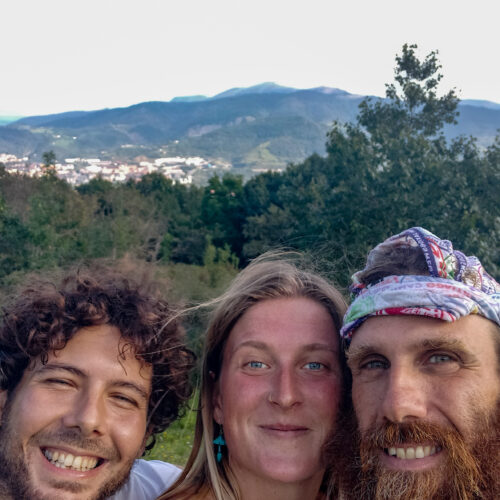
Cima with Greg and Dee, arriving in Bilbao.
Where do you usually sleep?
Sleeping has actually often been a dilemma. I can say that when I’m on an official Camino, such as the Northern, Portuguese, or English, etc. there are a good number of shelters in fantastic dormitories with people “ronca” (“snoring” in Spanish), smells of “queso” (cheese) coming from shoes, clothes… and that is part of the Camino. But I had my tent with me for several months, I still have it now since I left Lisbon on January 22, 2024. I slept in the tent a good 75-80 days out of the 90 or so I spent in France. I bivouacked, as I took advantage of campsites. It depends on the kilometres I do and can then actually do that day, so I don’t have a rule and I adapt to the moment. Sleeping in a tent for me is not shabby or sad – quite the contrary.
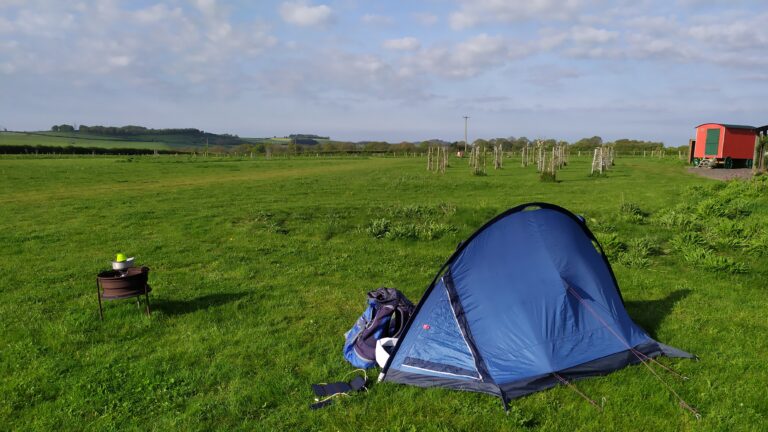
Cima’s sleeping set up in the English countryside.
What challenges have you faced during the Camino, and how did you overcome them?
There have been different challenges and difficulties that fortunately I overcame. I had a couple of anxiety attacks, tachycardia, but maybe it was due to too much humidity in the tent in England and France. Sometimes the problem was finding food, especially in France on Sundays, it’s a disaster (everything is closed), but I never starved. It takes a lot of spirit of adaptation and thinking about the solution. Every day I find myself solving problems that I didn’t even generate. A challenge can be a tough stage but being a marathon runner, I understand when it’s time to stop, regain my strength, and then the fatigue doesn’t bother me, in fact it’s good endorphins.
How do you balance your work with walking?
I have my computer with me and when I have a deadline, I stop for the days I need to. I have good organizational skills now, after over fifteen years as a freelancer. I recently had upcoming deadlines and actually stayed three nights in the same place. I’ve worked everywhere: in an ancient mill valley, at the beach, in a field, at the bar, monastery, hostel, anywhere, even if it’s just for two quick corrections and to send the file. Not being in a hurry, but having all the time in the world, with good organizational skills, it can be done. It takes strength and perseverance. But I also have to thank all those people who with a small or substantial donation supported me.
How has food and drink contributed to your overall pilgrimage experience?
Food is very important to me, and I have never been the classic Italian who has to and expects to eat Italian everywhere he goes. In fact, I’m quite the opposite. I’m the one with a baguette under my arm strolling the streets of Cherbourg, who indulges in oysters and a good glass of Bordeaux wine. I prefer Cider to beer in Brittany. Fish ‘n Chips and stout beer in England, preferably at the pub. The café guy with leche, tortillas, bizcocho, tostada, churros, pulpo, pinchos (in the Basque Country) tapas in Spain. The classic pilgrim from café com leite and Pastel de Nata, Anis, Super Bock, Sagres, Vino Porto, Pastel de Bacalahu in Portugal.
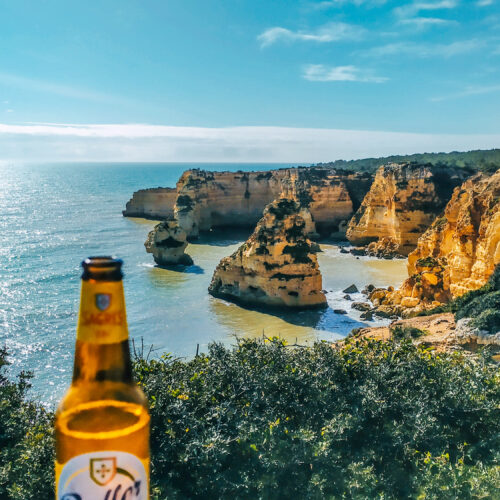
A rewarding beer at Sentiero dei Pescatori, southern Portugal.
When I walked alone, I was often offered drinks in the evening in some bar or restaurant where I stopped. Like a breakfast offered to me by two perfect Spanish strangers I met by chance in Portugal. A street vendor giving me two oranges just because I walked past the stall (I didn’t have any small change to pay him, but he told me: “quiet, it’s a gift”). The best cous cous with lots of love given to me by Claude and Mama Fatima of the little Lacle delicatessen in Auray, Brittany.
At one point, we didn’t know where to sleep. We arrived in this small village. On the right is an open gate, a garden, a semi-open van, and noises like spring cleaning. We enter, but no one answers. Then Vincente comes out and greets us and allows us to set up our tents in his garden. He gives us a chance to charge our cell phones. As we dine in the garage, his wife arrives and brings us dessert (crepes, yogurt). The evening ends at their house between coffee, chit-chat, and without getting a penny out. In the morning we tried to leave something, but they didn’t want anything.
In what ways has the Camino changed or surprised you?
I found that the French are not unkind. Probably only the Parisians. In fact, they are super helpful if they see you wandering around with a mammoth backpack. I’m used to the “Milanese coldness”, so to find so many helpful, kind people actually surprised me. Even just a courier in a van who sees you walking under forty-degree heat stops and gives you a cold bottle of water. As I said before, I am more and more convinced that kindness is stronger than meanness.
Today for instance, I’m in Andalucía and I walked past a restaurant on the beach. I don’t know if I accidentally gave the impression that I was looking for food or that I looked at the dishes, but a few meters past this place, I hear a call, “Hola Amigo…” It’s a girl asking me if I have eaten or wanted food. Absurd, I really didn’t ask for anything, didn’t even stop to see the menu etc. and yet this girl, perhaps seeing the shell on my backpack must have thought I hadn’t eaten lunch yet. It’s really absurd, like those who ask you for a picture. Maybe it’s the long beard and the giant backpack that makes for a lot of folklore.
How do you balance solitude and social interactions on the Camino?
Loneliness to me personally does not scare me and has never held me back. Perhaps it’s because I have often travelled alone for a variety of reasons. Many years ago, for example, on Sundays, many friends didn’t want to do anything while I wanted to go, travel, see an exhibition, a city, a small town. Some friends, when I was young, even asked me, “but why do you go alone, don’t you get bored, isn’t it bad?” I always replied, “since I’m alone, shouldn’t I move and travel?” Traveling alone gives you a chance to meet other people. It’s kind of like those people who would never go to a hostel, to a dormitory to sleep, but rather they would take a single (maybe) hotel room. So, you hardly know anyone, instead if you mix in the crowd you have a better chance.
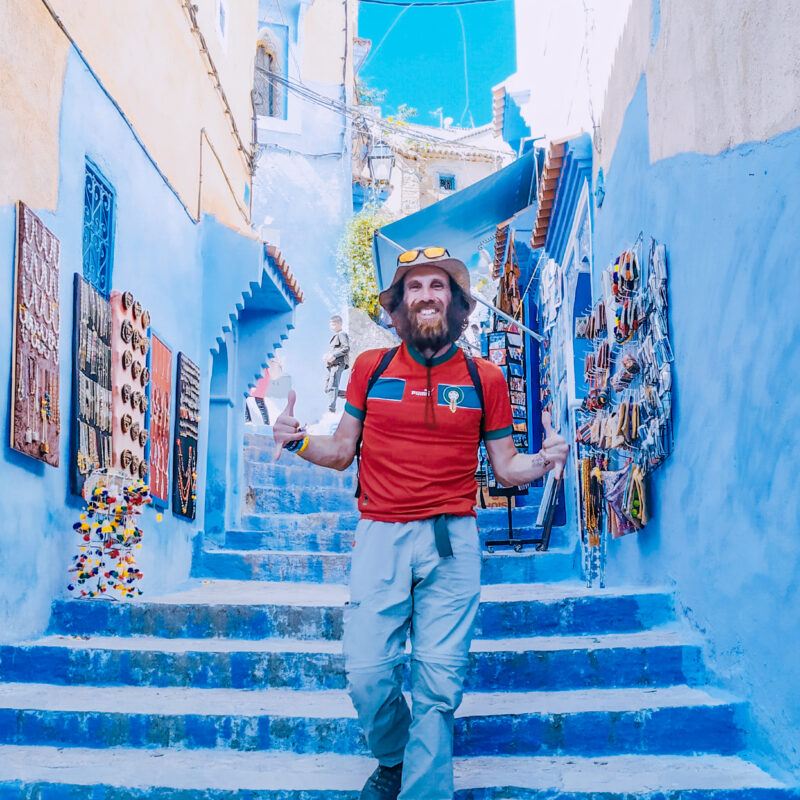
Pictured in the city of Chefchaouen, Morocco.
A silly example is Eva, whom I met on the bus going to Chefchaouen (the blue city in Morocco). If I was in a car, I would never have met her, I would not have tasted the olives of a friend of hers whom she in turn met a week earlier and invited to her home in the mountains in an isolated village in Morocco. So, I’ve never been afraid of loneliness because honestly, I am fine on my own. I have my own time, my own things to do, but that does not exclude (absolutely not) company. A few days ago, I had a fleeting breakfast in Gibraltar with Lorenzo (ospitalero on the Portuguese Camino). So technically I am alone but then I meet people or stay in touch with many people.
What role does nature play in your Camino journey?
Nature is a fundamental part and one that I respect a lot. The landscapes I’ve seen were often in places that were unapproachable except on foot. I don’t consider myself an eco-traveller, but I have a deep respect for nature. You will never see me throw a piece of trash or a plastic bottle except in a bin. I store it in my backpack and at the first opportunity I get rid of it. I still dream about some sunsets at night. Like those sheer cliffs that maybe I cursed in the moment but then thanked for giving me the chance to admire such magnificence.
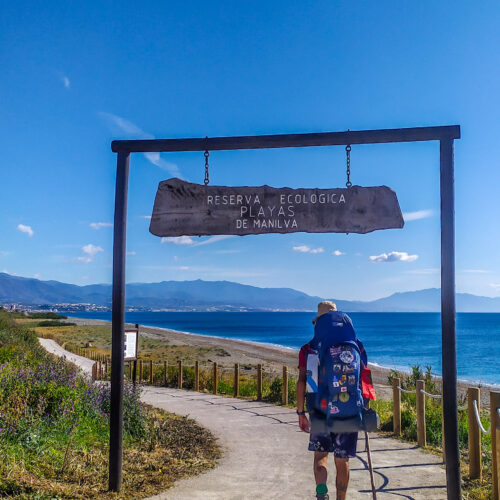
Cima walking through an ecological reserve in Andalusia, Spain.
Have you found any specific rituals or routines helpful during your journey?
I don’t know if it can be considered routine but if I can, I have a second breakfast as if it were the first. I say out loud, “Buen Camino” even if I am alone before setting out. In the last few months, but especially when I sleep in the tent, I lie down on the mat putting myself on my left side and say, “Good night Vero.”
What advice would you give someone considering walking the Camino for the first time?
To not overthink it, to just pick up and go. I am not the type to give advice on backpacking, weight, clothes to bring, etc. That’s why there are so many groups and guides that I honestly just ploughed through for the very first Camino, but then I did (as is often the case) my own thing. I don’t have the pretensions and knowledge to teach anyone anything. Also, because it’s not advisable to walk around with a twenty-pound backpack. You do it if you feel like it. You do it if you want to. But also, just if the idea of doing a Camino is in your head, then do it. Take it, and step by step you’ll understand why everyone speaks so well of it, new people come back in some ways. When you share the same things, the same road, the same weather, you discover so much goodness in people. It can be a good way to look inward and understand a lot about yourself and others.
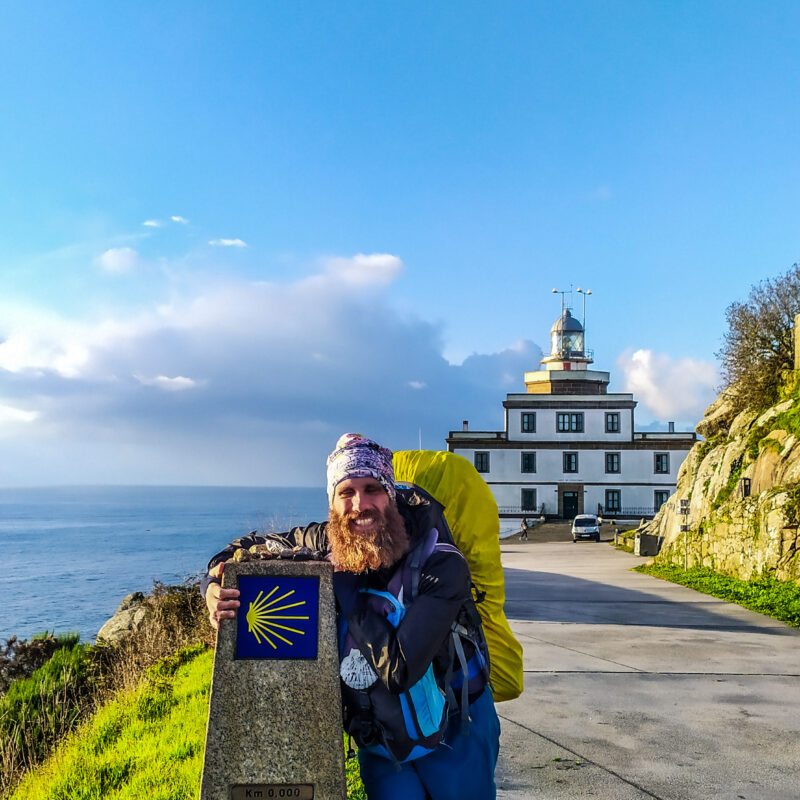
Arrival in Fisterra, Spain, believed to be “Land’s End” (Finis Terrae) and the final destination of a route marked in the sky by the Milky Way.
How do you plan to integrate the lessons learned on the Camino into your life after completing the journey?
The question implies an end. I think this “journey” has no imminent end. My head is always traveling, it’s in constant motion. I’m sure I will return home, as I’m sure I will stay only a handful of days. I already have other adventures in mind. Of course, as my friend Valeria would say, “Watch out Cima, sooner or later you will have to find a place to stay for a while. And watch out that sleeping in a different place every night is potentially a drug…”. She is right that sooner or later I will have to find a place or person to stop. But as long as I have the strength, the mental clarity, the curiosity… I will continue.
I realised that we have so many prejudices, we judge by hearsay, we stop at appearance, we never delve deeper. There are many more good people than bad ones. If you can make a gesture, share something, do it. Long ago, I probably would’ve been selfish. Days ago, I met a German cyclo-traveller who was going to Morocco and I gave him my Moroccan SIM card. The help doesn’t have to be charitable, but it has to be felt, it has to be pleasant. There doesn’t always have to be a comeback.
Follow Cima’s journey via his Instagram: @cimaadventurer
Walk with all your body strength.
Walk with all the energy of your mind.
Walk on long beaches as well as on sharp climbs.
Walk with a smile between small villages as if on treacherous descents.
Walk with spirit through still dark woods as in valleys at dawn.
Walk with the same joy in the incessant rain as on a warm sunny day.
Walk with the desire to get to know each other without fear of loneliness and silence around you.
And now stop and enjoy pleasant company like a sunset over the ocean.
Poem by Roberto Cimarosa, upon arrival in Fisterra, 23 October 2023.




